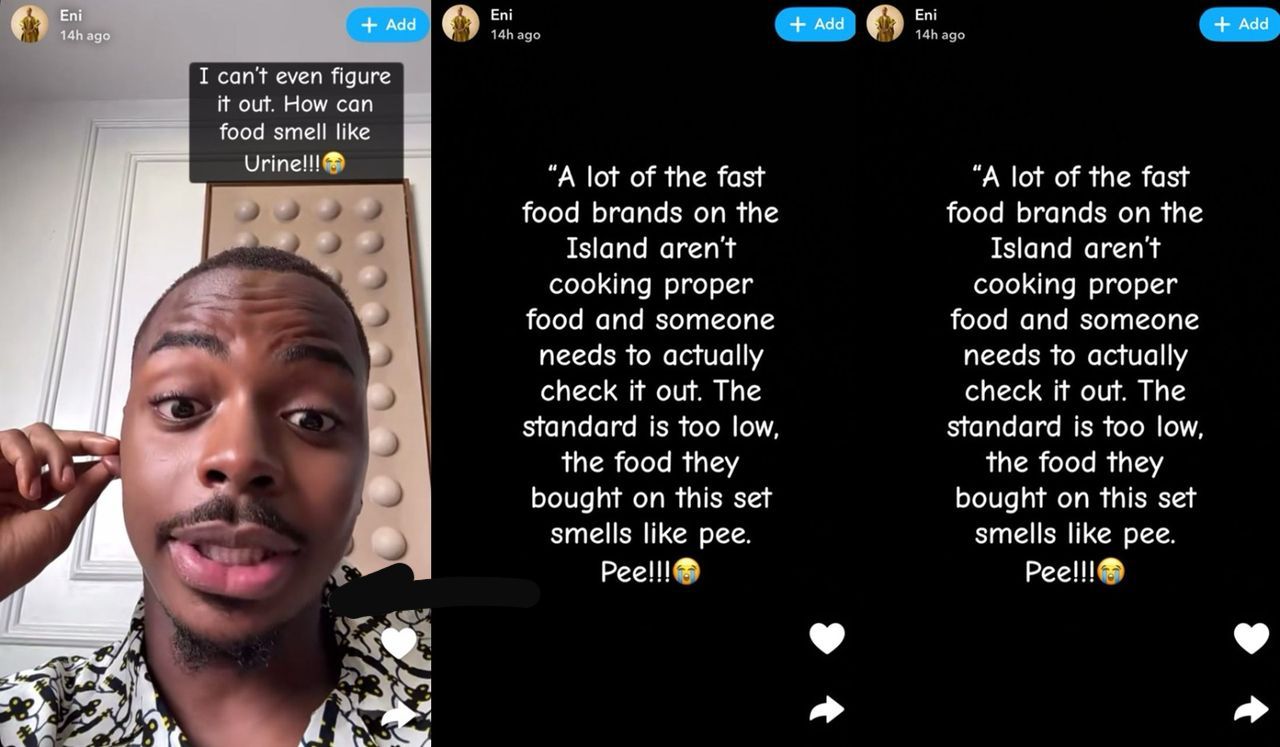
"Smells Like Pee!" – Enioluwa Slams Lagos Island Fast Food Over Shocking Hygiene Standards

Popular Nigerian influencer and content creator, Enioluwa Adeoluwa, has sparked outrage and a fresh wave of public scrutiny over the state of hygiene and food quality in Lagos Island eateries, after a shocking post where he claimed the food bought on a film set smelled like urine. The dramatic statement, which has since gone viral, was posted on his X (formerly Twitter) account and has left Nigerians both amused and deeply concerned.
In his own words, Enioluwa tweeted, “A lot of the fast food brands on the Island aren't cooking proper food and someone needs to actually check it out. The standard is too low, the food they bought on this set smells like pee. Peel!!” The bluntness of his message—paired with the shocking imagery of food that allegedly smells like urine—instantly grabbed attention across social media platforms, drawing mixed reactions from fans, fellow influencers, and Lagosians who have long battled with substandard food services in some parts of the city.
Lagos Island, known for its vibrant commercial hubs and high-paced lifestyle, is also home to a wide variety of restaurants and fast-food chains. But despite its outward cosmopolitan appeal, Enioluwa’s tweet shines a harsh light on an ugly reality: not all that glitters in Lagos is gourmet gold. Many have begun to echo his sentiments, sharing their own horror stories of food that tasted off, looked questionable, or left them with food poisoning after what was meant to be a quick bite from supposedly reputable eateries.
While some tried to dismiss his remarks as an exaggeration or a moment of dramatic flair, others took it more seriously, urging relevant authorities like the National Agency for Food and Drug Administration and Control (NAFDAC) and Lagos State health officials to swing into action. The concern isn't just about one bad meal on one set—it’s about a broader problem in Nigeria's food industry where hygiene standards are often compromised in favor of speed, cost-cutting, and unchecked expansion.
Enioluwa, who is known for his energetic personality and strong opinions on lifestyle, beauty, and fashion, clearly did not make the accusation lightly. Being on set, surrounded by professionals who expect a certain standard of service and care, only to be served food that allegedly smells like urine, points to a complete breakdown in quality control. For someone with his platform and influence, raising the alarm publicly not only sheds light on a personal experience but serves as a wake-up call to food vendors who think customers won’t notice or speak up.
Following his post, many other social media users began recounting their own experiences with food in the area. Some complained about strange tastes and foul smells in meals bought from popular spots, while others highlighted unhygienic conditions they observed in kitchens, including dirty uniforms, improper storage of ingredients, and even cockroaches running across countertops. The floodgates have seemingly opened, and what started as a single tweet has evolved into a collective complaint.
Some food vendors on the Island have reportedly responded indirectly by posting pictures and videos of their kitchens to prove cleanliness, while others have chosen silence, possibly hoping the storm will blow over. But Nigerians, especially those who eat out frequently due to busy work lives or long commutes, are paying closer attention than ever before. After all, the idea that a meal could be served with a stench that resembles urine is not only disgusting—it’s potentially dangerous to health.
Beyond the immediate disgust and virality of Enioluwa’s tweet, the deeper issue at play is one of regulation and accountability. How many restaurants and fast food joints undergo routine health checks? How many are operating with expired products, untrained staff, or unsanitary cooking conditions? In the absence of strict enforcement and public health transparency, consumers are left vulnerable, and influencers like Enioluwa become the accidental whistleblowers for problems that shouldn’t exist in the first place.
What’s perhaps most ironic is that Lagos Island is a location often associated with affluence, business elite, and top-tier entertainment. Yet, even in the heart of this supposed sophistication, people are being served food that allegedly smells like bodily fluids. It raises uncomfortable questions about how widespread the problem might be in less “visible” parts of the city, where customers may not have the voice or audience that someone like Enioluwa has.
Meanwhile, the influencer’s followers have praised him for speaking up. “We need more people with a platform calling out nonsense,” one user wrote. “This is why food vendors should be inspected regularly. You can’t just be selling rubbish in the name of business!” another added. The pressure is mounting for both vendors and regulators to step up their game, because in 2025, no one should be worrying about food hygiene in a city like Lagos.
Enioluwa’s dramatic yet eye-opening comment may have started as a singular complaint, but it has fast become a trending topic that speaks to a larger health and consumer safety issue. Whether or not action will be taken remains to be seen, but one thing is certain: Nigerians are tired of being shortchanged with subpar service, especially when it involves something as essential and sensitive as what they eat.
For now, the influencer’s call-out remains a hot topic, not just because of how outrageous it sounds, but because of how painfully real the issue is. If a high-profile content creator can have such an experience on a professional film set in the center of Lagos, what hope is there for the average worker grabbing a quick lunch from a street-side vendor or fast-food counter?
As conversations continue and awareness spreads, the hope is that public pressure will force a cleanup—both literal and figurative—of the food service landscape in Lagos Island and beyond. Because no one, no matter how hungry or in a hurry, deserves to be served food that smells like pee.


